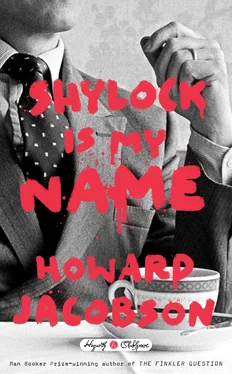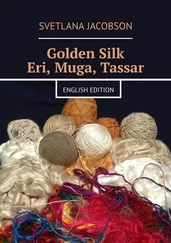It was at this time — otherwise Beatrice would surely have fled for ever — that Kay had her stroke. One of her doctors was a friend of Strulovitch’s and assured him that while his running battle with his daughter could have contributed, other factors played a more important part in the aetiology of her sickness. She had always been a frail and nervous woman. The stress brought on by the long wait for Beatrice, and then her own anxiety for the girl’s welfare, would also have contributed. Strulovitch knew it. You can want something too much.
But he was a superstitious man. If you do wrong, you suffer — that’s morality. Superstition, which operates on a grander scale, has it that if you do wrong, someone else suffers. Someone you love. Would his wife have been with him still had he allowed Beatrice to throw her life away on whom she chose?
Which he doesn’t doubt she is going to do anyway.
—
Feather-bedded, cocooned in silk, the apricot and indigo of the Chihuly chandelier reflected in his narrowed eyes, Shylock lay awake within the force field of magical influence emanating from Alderley Edge, thinking of Jessica. Wizards or no wizards, he could not unbury her or uncurse her. Nor could he abruptly unfather himself of concern for her. The story ended where the story ended, but while he grasped the finality of that for him, he could not stop himself imagining the misery waiting in store for his daughter.
This much he knew:
Those who hated him so much as to profit from his loss of her and laugh openly at his sorrow would never reconcile themselves to the fact that she was Jewish. Blood would out. She was not daughter to her father’s manners, she said, but Lorenzo, the rascal who pilfered her, along with those who conspired in the misappropriation, could not stop commenting on her difference from the man she was ashamed to call father, her gentler (for which read more Gentile) disposition, her greater chance of making it to heaven, the fairness of her looks — ivory to his jet — and when all you can remark is difference then all you are aware of is similarity. That she came bucketed in his ducats only went to show how present he was in their estimation of her. How long before Lorenzo woke to find his limbs stretched out by Shylock’s?
The naivety of daughters! To think that Lorenzo’s love would make her Christian when nothing in his character or behaviour bore the notation of Christian as a Christian would describe Christianity. Was it Christian to avail himself, without pausing long enough to scratch his backside, of her father’s gold and jewels? Was it Christian to make merry with her betrayal and watch her empty her pockets in a single mad night in Genoa? A subtle gradation of morality attaches to profligacy: to blow a fortune of one’s own is reprehensible, to encourage another to squander hers is iniquitous. Or is that iniquity what Christians mean by virtue? Virtuous to divest another of his worldly goods so long as you deplore the means by which he came by them…?
He remembered her as a child in Leah’s arms and mourned her as he mourned her mother. What had he done to make her hate him? “Hatred” was not too strong a word. The monkey proved that. To buy a monkey with the ring Leah had given him was a profanation of them both. But whatever she had sold to buy it with, a monkey was a profanation of her ancestors and education, everything he and Leah had taught her since she was a child. Not for a wilderness of monkeys would I have sold that ring, he told Tubal, and as he said it he saw the wilderness, the vast expanse of feral nothingness, lawless, godless, governed only by greed, hyenas, and the blind impulse to reproduce.
Was that what Jessica hated, not him or the mother who’d prematurely left her, but the idea that the wilderness should be civilised — the wilderness in her heart and the wilderness that was the company she kept? Christianity, when all was said and done, counted as no more than an interregnum: the only true distinction was between Judaism and paganism, and when a Jew felt the old paganism itching in his blood he had no choice but to reject the interdictions he’d been brought up to listen to. Jessica wasn’t interested in Christians. What she wanted was to be back in the wilderness with the monkeys.
—
Strulovitch found his guest in the garden when he woke. It was still early. And cold. He was wearing his overcoat, with a black scarf around his shoulders — to Strulovitch’s eye not unlike a prayer shawl — and was sitting on his Glyndebourne stool talking to Leah. A few remaining droplets of dew sequinned the lawn, lighting him up from below like footlights.
“So, Leah, it would seem that I am presently to become a Christian,” he’d been saying.
This was a familiar theme between them. He had waited for her, as always, to say something in return. But presumably she was too amused for words. “Some Christian you’ll make!” he knew she was thinking.
He couldn’t resist indulging her sense of humour. “You can just see me, Leah,” he liked to go on, “taking my pew, gowned in white for when the sacred moment of baptism arrives, my head bowed, waiting in beatified gratitude for the sermonising to start. ‘We have in our presence today, by the grace of Jesus Christ, a Jew notorious for…’ ”
He rose from his stool and did a stately dance for her, rubbing his fingers together — the Waltz of the Money-grubbers.
But there it had to come to an end. He sat down again. His conversion to Christianity was the ultima Thule of their graveyard pillow talk. They might approach it forever, nose it like sharks circling the smell of blood, but they would never be able to move in for the final kill. Before Shylock had been able to convert, or pretend to convert, the footlights dimmed.
Had he or hadn’t he?
Well that was simple to answer. He hadn’t.
Hadn’t been given the opportunity.
But would he or wouldn’t he?
Hearing Strulovitch’s soft tread, he stood up quickly and extended a hand. He was impressed by his host’s attire, a dressing gown that might have been painted by Matisse, and crested slippers. A gown and slippers of comparable sumptuousness had been left for him in the guest bathroom, but he was uncomfortable in other men’s clothes. And he didn’t want to look as though he intended to make himself at home. Strulovitch might fear he would never go.
“Shall I leave you?” Strulovitch asked him gently. He felt obscurely honoured — no, not obscurely, simply and deeply honoured — that Shylock felt the presence of his wife in Strulovitch’s garden. It was one thing to accept Shylock’s conviction that there was nowhere on the wheeling planet that Leah wasn’t buried, but for her to be specifically buried here …!
Strulovitch lowered his head. He wasn’t a religious man but he still believed that the beloved dead consecrate.
“We were enjoying a joke,” Shylock said. “We try to keep it light.”
Strulovitch privately hoped he was a better jokesmith with his wife. Poor Leah, otherwise, having to lie there, year after year, feigning amusement.
“May I ask the subject of the joke?” he said. “Not another one about Mr. G rr eenberg being unvell, I take it?”
“No, nothing to do vid G rr eenberg. We like to speculate on my becoming Christian. The idea entertains my Leah.”
“I’d have thought it would horrify her.”
“Would have horrified her had it come to pass, but time was on our side. It closed its fist before it could fulfil its purpose. We can smile that something was on our side.”
“Do you feel you baulked the Christians of their prize?”
“That presupposes that they knew what their prize was.”
“They sounded sure enough. Get thee gone …”
Читать дальше












